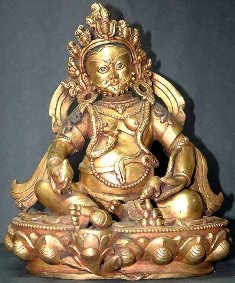"Ganga Cha Yamuna Chaiva Godavari Saraswati,Narmada Sindhu Kaveri jalesmin Sannidhim Kuru"
In this water, I invoke the presence of divine waters from the rivers Ganga, Yamuna, Godavari, Saraswati, Narmada, Sindhu and Kaveri. These rivers are considered as goddesses and I pray to them for considering me for their blessings.
Story:
Kubera, god of wealth, had become arrogant. One day he decided to host an extravagant feast for the gods, such a feast as never had been hosted before. It would increase his prestige and show all men and gods the extent of his wealth and influence. Accordingly, he went to Mount Kailash to invite Lord Shiva. Shiva was his patron. Kubera owed all his wealth to Shiva who, pleased with his devotion had given him the boon that his wealth would never diminish, no matter how much he spent. Shiva declined to come but said he would send his son, Ganesha. Kubera was disappointed. Shiva's presence would have been a feather in his cap. But at least he was sending Ganesha. It would have been a terrible snub if no one from the family were to come. Kubera resolved to make the feast so grand that Shiva's absence would not be felt. The guests were many, thousands of them, both gods and men. They were accommodated in a huge hall built especially for the purpose. The chief guest, Ganesha, was the last to come. The moment he entered, he began to ask for food. He was shown to a seat of honour and tantalising dishes were set before him. He gulped them down and asked for more. He was given a second helping and then a third but his appetite remained undiminished. Kubera ordered his army of cooks to produce more food but they could not keep pace with Ganesha's eating frenzy. The elephant-god was eating food meant for thousands. When he had finished all the food set before him, he began to shout, "Give me more, give me more!" and then getting impatiently to his feet, rushed to the enormous kitchen and devoured all the food there. Kubera was aghast. All the food was gone and the guests had not been fed. Worse, Ganesha was still hungry."You call this a feast?" Ganesha admonished Kubera. "There's no food here. I'm going home."Kubera pleaded with him to stay, promising him more food in a little while but his young guest was in no mood to listen. He got on his mount and sped away. Kubera, fearing Shiva's wrath, followed in his own vehicle. When he arrived at Kailash, he found Ganesha complaining loudly to his father about the lack of food at his feast. "What's this I hear, Kubera?" asked Shiva, turning to the god. "No food at your feast?""I....I....," mumbled Kubera. "Go in and ask your mother for some food," said Shiva to his son. "I'm sure Kubera did his best.""I did, I did, my lord," said Kubera, feeling miserable. His feast had turned into a farce. Instead of adding to his prestige it had made him a laughing stock. But he was relieved to see that Shiva did not appear to be angry. He fell at his patron's feet and begged forgiveness for his pride.
















